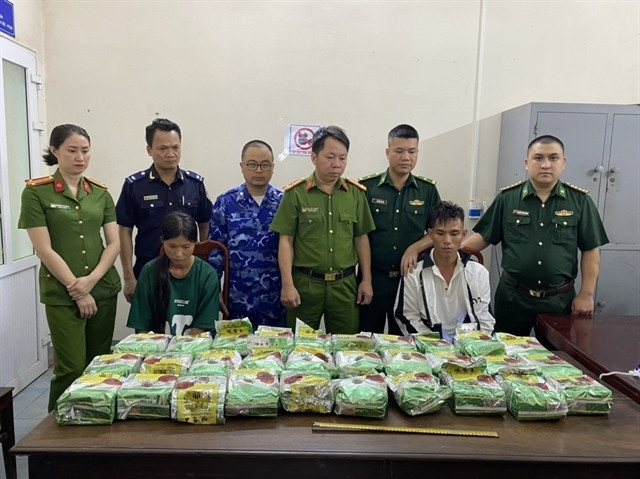 |
| Police in Nghệ An Province last Friday busted a transnational drug trafficking ring from Laos to Việt Nam, detaining two suspects and seizing over 20kg of drugs. — VNA/VNS Photos |
The crime and drug situation in Việt Nam is growing increasingly complex, with recent incidents involving young people using narcotics, increasing concerns about the risk of drugs infiltrating schools.
Particularly alarming is the illicit use of drugs, occurring in many localities, especially in major cities within numerous universities, colleges and educational institutions.
Captain Đinh Văn Cường, chief of Hoàng Liệt Ward Police, Hà Nội's Hoàng Mai District, told Việt Nam News Agency that drug-related crimes are becoming increasingly sophisticated.
Schools have become hot spots for illegal dealing and consumption, with a recent trend of selling and buying drugs within e-cigarettes through multi-level marketing, with drug addict students acting as sellers.
This method is particularly dangerous as it can spread quickly, turning many young people into victims.
"The cases of illegal drug use, trafficking and possession show that the perpetrators are getting younger. Sixty per cent of first-time drug users are between the ages of 15 and 25, with many being students," Cường said.
"This situation requires coordinated anti-drug measures from all sectors of society, starting from the grassroots level."
Director of the Drug Testing Centre at the Institute of Forensic Science under the Ministry of Public Security, Colonel Nguyễn Xuân Trường, expressed concern over the dangers of new drugs and psychoactive substances similar to recreational drugs like happy water, laughing gas and paper squares, laced with drugs.
He said despite being advertised as merely stimulants and not actual drugs, these substances are still highly harmful, strongly affecting the central nervous system and the cardiovascular system.
These substances are often mixed into common foods and beverages such as e-cigarettes, snacks and bubble tea, making them difficult to detect just by looking at them, so parents, guardians, schools and young people need to be extra vigilant.
On September 14, 2023, the Drug Crime Investigation Police Department (C04) caught four people mixing and injecting drug-laced essential oil into e-cigarettes at a warehouse in Hà Nội’s Thanh Trì District.
Authorities seized over 3,500 drug-laced e-cigarettes, 84 litres of drug solution, a drug-injecting machine, components for 10,000 e-cigarettes, one million cigarette filters and various production materials. They also confiscated 15,000 illegally imported flavoured e-cigarettes.
Ringleader Lê Anh Thơ, 28, admitted to buying synthetic cannabis and e-cigarette components from China, paying with Bitcoin.
Thơ and her accomplices infused the drugs into e-cigarettes and cigarettes and sold them online, falsely claiming they were non-drug stimulants.
In mid-2023, C04 uncovered a happy water drug operation, arresting 17 people and seizing 217kg of synthetic drugs.
They later arrested 18 year old Bùi Trung Nguyên, in HCM City, seizing 3kg of synthetic drugs and production equipment.
The network's leader, Nguyễn Thị Hoài, who was 31, had learned how to mix happy water drugs abroad and returned to Việt Nam to start production.
This group sold drugs via social media, used bank transfers and hired transport companies to move drugs and materials. To avoid detection, they frequently changed locations, police said.
According to the Drug Crime Investigation Police Department, nearly 230,000 people across the country are currently addicted to drugs, using them illegally or have been to rehab.
About 60 per cent of first-time drug users fall between the ages of 15 and 25, with some as young as 13. Around 95 per cent of them use synthetic drugs, 70-75 per cent are aged 17-35.
It is clear that students and young people, susceptible to influence and eager for new experiences, are increasingly targeted by drug traffickers.
Persistent use of synthetic drugs can lead to psychosis and impaired behaviours, posing risks to users and those around them. In 2023, nearly 1,500 synthetic drug users experienced psychosis, resulting in 30 criminal cases.
Exploiting liberal policies
 |
| Hà Tĩnh Police on Sunday arrested two suspects from Thanh Hóa Province for illegal drug trafficking, seizing 30kg of methamphetamine along with related evidence. |
The Government is currently aiming to streamline customs and border controls, to boost investment and business activities, but this is being exploited by international drug syndicates colluding with locals to smuggle drugs into Việt Nam via Nội Bài international airport.
Increased flights and trade volume pose challenges for customs in maintaining efficient clearance while upholding security protocols.
Recently, police in Hải Phòng City, in co-ordination with Hà Nội customs and police, dismantled a major drug trafficking network smuggling drugs from European countries, seizing 45,000 pills.
Similar interceptions at Nội Bài international airport since 2022 have led to 68 cases, involving 44 arrests and over 905kg of seized drugs.
Customs deputy director Phùng Quang Minh said that drug smuggling via air is becoming increasingly complex, with narcotics often concealed within machinery to evade detection, whereas previously they were simply hidden in foods, alcohol or cosmetics.
Criminals exploit technology advancements, using encrypted communication via gaming consoles for illicit exchanges.
Meanwhile, international shipments via express services present unique challenges, with criminals leveraging postal conventions to camouflage contraband, including drugs, as gifts between countries.
Since early 2023, customs has worked closely with other forces, uncovering and arresting three suspects in four separate cases, seizing thousands of grams of methamphetamine, ketamine and cannabis.
Colonel Trần Quyết Thắng, head of Hà Nội's Drug Crime Investigation Division (PC04), said criminals previously exploited international express delivery services by concealing drugs within goods.
Now, they have established international courier companies in Europe, with subsidiaries in Việt Nam across various provinces and cities, facilitating drug imports through air routes.
Drug trafficking via air routes involves sophisticated operations by professional groups, forming tightly organised networks linking domestic and international actors in drug buying, selling and transport into Việt Nam.
Nguyễn Hùng Anh, director of the General Department of Customs' Anti-Smuggling Investigation Department, noted a rising trend in drug-related cases and arrests, with increasing complexity and the emergence of new, unlisted drugs.
Drugs are increasingly trafficked for consumption in Việt Nam or transit to third countries, with detectives primarily looking at the international airports of Nội Bài, Tân Sơn Nhất and Đà Nẵng, as well as through express delivery services.
Efforts to sever foreign drug supply chains to Việt Nam hinge on seizing drugs and apprehending suspects, requiring close cooperation among law enforcement agencies, Anh said.
Customs plans to bolster inspections of imports, exports, luggage, vehicles and border crossings to swiftly uncover drug concealment attempts.
"We've enhanced training and equipment use, including specialised tools and service dogs, to bolster our anti-drug efforts," he said.
Strong measures to combat drug trafficking
Lieutenant General Nguyễn Ngọc Quang, deputy director of the Drug Crime Investigation Police Department, voiced concerns about the intricate global and regional drug landscape, specifically criminals are ramping up production of synthetic drugs such as methamphetamine, ketamine, and MDMA.
These groups are sourcing chemicals from countries like Myanmar, Laos and Cambodia to fuel illicit drug manufacturing, using Việt Nam as a transit point for trafficking drugs to third countries.
 |
| Hải Phòng Central Youth Union, in collaboration with the Ministry of Public Security, on June 13 organised a programme to promote drug prevention among youth. |
Locally, Vietnamese criminal groups are collaborating with international counterparts to establish organised networks for the illegal trade, distribution and transportation of drugs.
Besides local consumption, a significant portion of these narcotics is trafficked across borders.
New drug variants like happy water and e-cigarettes laced with drugs are gaining popularity among youth, despite not yet being classified under a Government decree on controlled substances.
Addressing concerns about new types of drugs potentially infiltrating schools, major general Quang said that the Ministry of Public Security has recently collaborated with the Ministry of Education and Training to enhance law education and drug prevention in educational institutions from 2024 to 2030.
According to statistics from the Ministry of Public Security, more than 1,700 students have been found to have illegally used drugs, with many students also involved in drug-related criminal activities.
He emphasised the need for schools and families to cooperate in managing and educating their children effectively.
Quang said criminal groups involved in illegal drug trading are not only attempting to bring drugs into Việt Nam via air and land routes but have also recently shifted towards maritime channels.
Since early 2024, due to Việt Nam and other countries intensifying efforts along land and air routes, these groups have adapted their methods to transport illegal drugs by sea.
He stressed the crucial role of of cooperating with other countries, particularly the neighbours of Laos, Cambodia, China and Thailand and working alongside Interpol.
These collaborative efforts aim to dismantle transnational criminal networks engaged in drug production and trafficking, reinforcing Việt Nam's commitment to preventing drug supplies from infiltrating its borders.
Police forces are increasing efforts in collaboration with local authorities to raise community awareness, enforce laws and encourage public participation in reporting drug-related crimes. — VNS